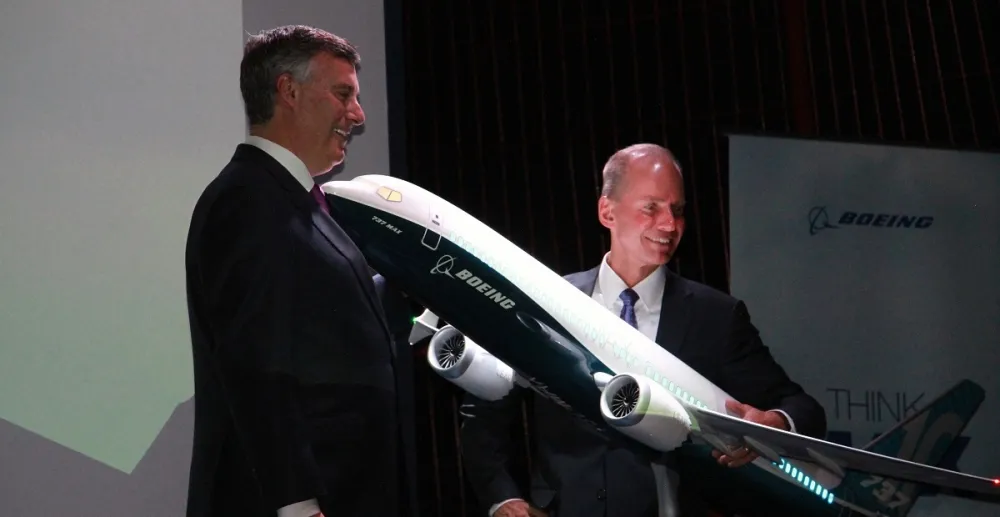
Boeing chief says company working to fully ensure 737 MAX safety
Mar 19, 2019

Boeing's chief executive recently emphasized the company's commitment to ensuring the safety of the 737 MAX aircraft. Following previous safety concerns and tragic incidents involving the model, the company is focused on implementing rigorous measures to enhance oversight and maintenance processes. Boeing is working closely with regulatory bodies and industry stakeholders to reinforce safety protocols and restore confidence in the aircraft. The executive expressed determination to learn from past mistakes and prioritize the well-being of passengers and crews. Ongoing efforts include increasing transparency and incorporating advanced technology to ensure the highest safety standards are met.
The Boeing 737 MAX has been a focal point of discussions regarding aviation safety and reliability. Following the unfortunate incidents that led to the grounding of this aircraft model, Boeing's leadership, particularly the chief executive, has committed to ensuring that the 737 MAX meets the highest safety standards before it returns to commercial service. The company is implementing a multi-faceted approach to enhance safety protocols, improve pilot training, and refine engineering practices. This renewed focus aims to restore public confidence in the aircraft and the brand as a whole.
The Commitment to Safety
Boeing’s chief has emphasized that safety is the top priority for the company. This commitment is reflected in several initiatives designed to bolster the overall safety of the 737 MAX. The comprehensive safety review process includes:
| Initiative | Description |
|---|---|
| Enhanced Training Programs | Revamping pilot training protocols to ensure pilots are fully equipped to handle any scenario. |
| Upgraded Software Systems | Implementing advanced software updates to prevent potential malfunctions. |
| Independent Safety Reviews | Engaging third-party experts to conduct thorough safety evaluations of the aircraft. |
By focusing on these key initiatives, Boeing aims to build a more robust safety culture not only for the 737 MAX but across all its aircraft models.
Engineering Enhancements
One of the critical areas Boeing is concentrating on is engineering enhancements. The 737 MAX has undergone significant modifications to address the issues that previously led to safety concerns. These changes include:
- Redesign of the Maneuvering Characteristics Augmentation System (MCAS): The MCAS system has been re-engineered to ensure it operates effectively without compromising safety.
- Improved Sensor Systems: Installation of more reliable sensors that provide accurate data to pilots, thus preventing erroneous readings that could lead to dangerous situations.
- Comprehensive Testing: Extensive ground and flight testing to validate the effectiveness of the new systems and ensure they function as intended.
These engineering enhancements are vital to ensuring the 737 MAX's reliability and safety, and they serve as a testament to Boeing’s commitment to quality and dependability.
Regulatory Oversight
Another key aspect of the safety assurance process is regulatory oversight. Boeing is working closely with aviation authorities, such as the Federal Aviation Administration (FAA), to ensure compliance with all safety regulations. This collaboration includes:
- Regular Consultations: Ongoing discussions with regulatory bodies to stay updated on safety standards and requirements.
- Transparency: Sharing data and findings from safety tests and evaluations with regulators to foster trust and accountability.
- Feedback Mechanisms: Establishing channels for regulators to provide feedback on safety initiatives and recommendations for improvements.
This partnership with regulatory authorities is crucial for Boeing to gain the necessary approvals for the 737 MAX to return to the skies.
Public Relations and Customer Engagement
Boeing recognizes that public perception is vital to its recovery. The company is actively engaging with stakeholders, including airlines, passengers, and the media, to communicate its safety efforts. Initiatives include:
- Public Safety Campaigns: Launching campaigns to educate the public about the safety measures in place for the 737 MAX.
- Open Forums: Hosting forums where customers can ask questions and express concerns related to the aircraft.
- Collaboration with Airlines: Working closely with airlines to ensure they are informed and equipped to reassure passengers about the safety of the 737 MAX.
These efforts are designed to rebuild trust and confidence in the Boeing brand and its aircraft.
Looking Ahead
The road to full safety assurance for the Boeing 737 MAX is ongoing, and the company is dedicated to making meaningful progress. As the aviation industry continues to evolve, Boeing's commitment to safety will remain at the forefront of its operations. Through enhanced training, engineering improvements, regulatory cooperation, and proactive public engagement, Boeing aims to ensure that the 737 MAX is not only a reliable option for airlines but also a safe choice for passengers.
In conclusion, Boeing's chief has reiterated the company’s focus on ensuring the safety of the 737 MAX. Through a comprehensive approach that includes multiple safety initiatives, engineering enhancements, regulatory oversight, and effective communication strategies, Boeing is committed to restoring confidence in the aircraft and ensuring that it meets the highest safety standards before it returns to service.
Related Articles

Explore Thailand: The Best Islands to Visit for Paradise, Adventure, and Relaxation

The Ultimate Guide to the Best Islands in Thailand for Your Next Getaway

Do babies need passports? How to get a passport for a newborn

How to get a U.S. passport fast: here’s how to expedite the process

What is Mobile Passport Control: 5 reasons why you should use it

SENTRI vs. Global Entry: A detailed guide

Do you need a passport to go to the Bahamas? Let’s find out

Do you need a passport to go to Mexico? A detailed guide

Do you need a passport to go to Canada? We got the answer

Do You Need a Passport for a Cruise: An Essential Travel Guide

Booster Seat Requirements: All the Rules to Follow in Your Rental Car

What Are the World’s Most Powerful Passports, and How Does Yours Rank?

How to Take a Passport Photo at Home: A Helpful Guide

You've got to have heart! Southwest's new livery

Your opinion: Should water be free on low cost carriers?

Young women bolder than guys as solo travellers
